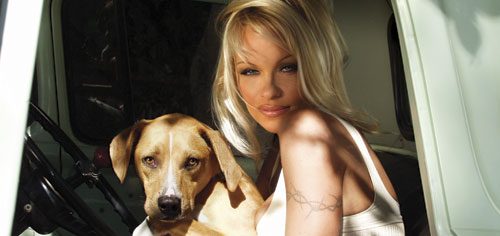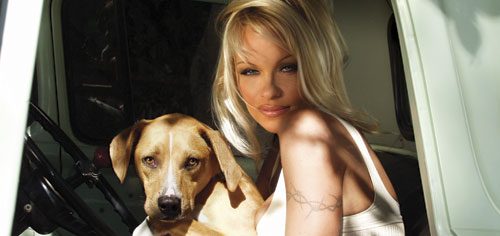

Actress Pamela Anderson as Activist
Compassionate Animal advocate
Ever since she catapulted to international stardom via Baywatch, Pamela Anderson has been one of the world’s most watched and talked-about people. Plug her name into an internet search engine and you will come up with over two million sites discussing every available detail of Pam’s life-and there have been plenty of details available. We’ve all heard the stories about her romantic entanglements, her plastic surgeries, and of course, those infamous home videos.
What tends to get overlooked in the media frenzy, however, is the courage Anderson has exhibited in the face of some very serious personal difficulties, and the dedication she shows to helping both people and animals. While most stars try to hide their problems from their fans, Anderson chose to go public with her battle against hepatitis C, as well as with the physical abuse she suffered in various relationships, in the hope that others might learn from her painful experiences. But nowhere has she used her fame to greater effect than in her animal advocacy. From her strict vegetarianism to her work as a spokesperson for the activist organization PETA, Anderson has become a strong voice in the fight to improve the lives of all animals.
Anderson’s love of animals began when she was a little girl growing up in Ladysmith, B.C. In that rural community, where many people enjoyed hunting, young Pam first learned that voicing her concerns about animals could make a difference. "I remember poking my head into the shed behind our house after my father returned from a hunting trip," she recalls. "I opened the door and saw a beautiful deer, her fur splattered with blood, hanging upside down. I screamed. My father tried to calm me saying, ‘It’s just an animal.’ That he had killed her on purpose made me hysterical." As a result, her father never went hunting again-and a passionate animal activist was born.
It wasn’t long before she was attracted to PETA (People for the Ethical Treatment of Animals), a group that campaigns tirelessly on behalf of animals. "At age 11, when I realized that hamburgers didn’t really grow in hamburger patches, but came from cows who screamed as they were electrically prodded to slaughter, I became a vegetarian and spent every spare moment rolling nickels I’d saved to join PETA, a group that always seemed to be in the news defending animals." Little did she imagine that years later, her nude image would be used in one of PETA’s most successful anti-fur campaigns ever.
However Anderson’s animal advocacy work is not always so in-your face. "I always try to make some sort of quiet protest whenever I’m in the public arena," she says. "At the recent British Style Awards, I chose to wear Stella McCartney-not only because she is British, but because she is cruelty-free and has been such a staunch PETA supporter." Anderson then mentions that Stella’s mother, the late Linda McCartney, was one of her role models as she was growing up. "Linda McCartney not only used her public platform to defend animals, but raised her kids to respect them. In my own way, I try to emulate her activism by doing things such as attempting to steer my kids clear of dairy by joking with them that butter comes from cows’ butts."
In addition to raising veggie kids, Anderson feeds her dogs a meat-free diet, which she believes can help promote a long, healthy life. "I’m a vegetarian and know that dogs can be vegetarian, too." Speaking authoritatively on the subject, she says, "Studies have shown that the ailments associated with meat consumption in humans such as allergies, cancer, and kidney, heart, and bone problems, also affect many non-humans. Also, most meat-based pet foods contain the same hormones, pesticides, and antibiotics that are found in commercial meat products for humans." She then points out that there are a number of commercial vegetarian dog foods available from companies like Wysong, Nature’s Recipe and Petguard.
While many veterinarians would disagree with such a diet for dogs, Anderson need look no further than her own dog-an active, senior Golden Retriever named Star-to find support for her argument. "Star has been my companion for 14 years now. I got him when I first moved to L.A. I used to take him to to the set of Baywatch, and he loved it. [He’s] always been a beach dog. I still take him to the beach every day."
Star may have enjoyed his time lounging around the Baywatch set, but Anderson is not a fan of the way animals are used in the entertainment industry. "Just like children, I feel it isn’t their choice to be there, and they shouldn’t be subjected to cages and the craziness of the business. The trainers assure us the animals are happy, and perhaps domestic animals like all the attention-though somehow I doubt it. I do know the only way to ‘train’ exotic animals is to kill their spirit, break them. It’s all pretty horrible to me."
She also sees problems with the way many people treat pet animals in our society in general. When asked what she feels are the worst of these in relation to dogs, she says, "I think the biggest problem is people viewing dogs as disposable objects. It’s ridiculous and cruel to buy a dog from a store and support further breeding when there are already millions of unwanted animals languishing in shelters, waiting for a loving home. And chaining dogs up outside by themselves all day should be illegal. Dogs are social animals, like us. They need company."
Anderson points out that at this time of year, people need to give special consideration to the requirements of pet ownership, especially when thinking of giving a pet to a child. "With Christmas approaching-when pet-giving is at its peak-I am begging you to really think hard about having the responsibility of a pet in your life. Kids should not be taught to think that they can ‘grow out of’ their pet."
It is clear that Pamela Anderson takes her own responsibilities as an animal caregiver very seriously, but she feels that her animals give just as much back. Between her dog Star and cats Elvis and Cash, she says, "I have something soft and warm to touch anytime I want. I’m such an affectionate person. I like to have something lovable around me all the time." Animals give us so much love. According to Anderson, "You can never have enough love." ■
Susan Kauffmann is a Vancouver writer who doesn’t wear fur. (That is, if you don’t count the dog, cat and horse hair always clinging to her clothes).
Join the newsletter and never miss out on dog content again!
"*" indicates required fields
By clicking the arrow, you agree to our web Terms of Use and Privacy & Cookie Policy. Easy unsubscribe links are provided in every email.